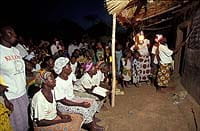by Noé Ngueffo.

Articles
Language committees
With a population of 15 million, Cameroon has an official literacy rate of 63%. Several communities have formed their own local language committees to help people learn to read and write
2005 Available in French, English, Spanish and Portuguese

Photo: Richard Hanson/Tearfund
Cameroon has two official languages – French and English – and about 250 local languages. With a population of 15 million, Cameroon has an official literacy rate of 63%. Several communities have formed their own local language committees to help people learn to read and write.
So far, 77 communities in Cameroon have set up language committees. These are organised and managed by the community. These local committees have come together to form the National Association of Cameroonian Language Committees (NACALCO). This co-ordinates their efforts and provides training.
Language committee activities
The committee’s main goal is teaching people to read and write, first in their own mother tongue, and then in the official language, and to use these literacy skills for community development. Everyone who speaks the local language is encouraged to join their local language committee, whatever their religion, age, sex or social status.
A team co-ordinates the work and should include representatives of all the various dialects if possible. This team usually meets twice a year to plan activities, action, report on achievements and discuss any other matters. Special effort is made to encourage women to take leading roles within each committee. Their involvement prompts other women and girls to register in literacy centres and should improve the present low literacy levels among women.
Training members is a key role for each committee. Members understand the importance of giving some of their time to the literacy programme of their community. This may include teaching literacy, helping to produce literacy manuals and post-literacy materials, providing supervision and follow-up to help literacy teachers or raising community awareness of the importance of literacy.
The training of trainers
Training of literacy trainers is a priority for the language committees to ensure the success and sustainability of their work. NACALCO staff, in partnership with SIL Cameroon, provide initial training. Later, each committee selects members for further training in various aspects of the work. All training is passed on to others in the community. This system increases the number of literacy workers rapidly. Much of the work is done on a voluntary basis and people’s time is limited. The more people are trained, the more the burden of work is shared.
Most of these volunteers earn their living through farming, carpentry and crafts.
Many have little formal education. They get involved because they want to help develop their mother tongue language, and to pass it on to their children. One volunteer said recently, ‘I care very much about developing my mother tongue because I don’t want to die culturally.’
On training courses, the volunteers are shown how to teach literacy in a participatory way, which involves the learners in the process. They get teaching practice and advice, and prepare texts in their mother tongue to use as material for literacy classes.
Funding for language committees
NACALCO promotes local contributions – money raised from individuals, local councils and organisations – as the most reliable and sustainable source of funding for language committee activities. When a training course is held, some families will offer lodging for the trainers and trainees from other villages. Other people will contribute by providing or preparing the food. According to an African proverb, ‘An individual can be poor, but a community is never poor’. This means that by joining hands together, poor people can achieve a lot.
It can be hard to prioritise literacy when people face more urgent problems such as hunger and poor health. However, language committees contribute to the struggle for sustainable development in Cameroon, by promoting literacy skills and encouraging self-reliance.
Noé Ngueffo is a linguist who works with the Ministry of Scientific and Technical Research. He is Director of NACALCO, BP 8110, Yaoundé, Cameroon. E-mail: [email protected]
Using proverbs to raise awareness
The Yemba Language Committee has a useful way of raising awareness and encouraging mother tongue literacy. They put up a board in the village square. Every few weeks, they write out a proverb in the mother tongue. When a small crowd gathers (mostly on market days), somebody from the language committee reads out the proverb and asks if someone can help the young people there to understand its meaning. This gives older people a chance to show their knowledge of their language and culture. The committee member explains that knowledge like this is useful to younger generations, but is not shared because it is not written down. If they attend a literacy centre, they will be able to write all this knowledge down, and so pass it on to their children and grandchildren. Then the volunteer tells them where to find the literacy centres and how to join the language committee, and gives out the class schedules.
Similarly Tagged Content
Share this resource
If you found this resource useful, please share it with others so they can benefit too.

Subscribe to Footsteps magazine
A free digital and print magazine for community development workers. Covering a diverse range of topics, it is published three times a year.
Sign up now - Subscribe to Footsteps magazine



